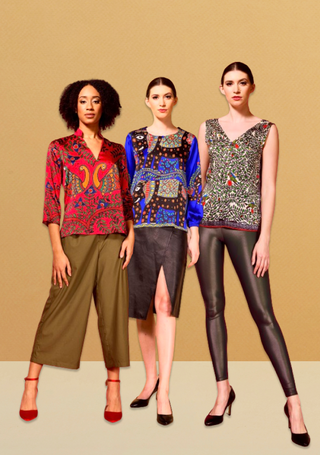Meet The Artisans
Meet The Artisans

Behind every silk tunic, top and scarf, there is a dedicated artist creating exclusive artwork for the collection.
And behind every unique presentation, there is a uniquely talented female Indian artisan. Their stories are etched in silk – every brush stroke to support female artists, every print to gift sight, every texture to save the world. Conscious expression paired with centuries of Madhubani tradition becomes the wearable art we take pride in. It becomes exclusively Naytra. We welcome you into our story.

Chandrakala Devi
Chandrakala Devi learned about Madhubani art by watching the women master-artists in the village of Ranti in Bihar, India. Captivated, she immediately took on the art form and has been creating Madhubani art ever since.
She has been supporting her family of nine by selling her artwork since the passing of her husband 25 years ago. Her paintings are marked by a strong sense of proportion, a sensitive observation, and a visualization of the nature around her.
Chandrakala has participated in several group shows curated by Manisha Jha, including the India Habitat Centre, The Nehru Centre Art Gallery, the Sir Seewoo Sagur Ram Goolam Art Gallery, the Crafts Museum, and the Rajeev Gandhi Bhawan. Currently, Chandrakala lives and works from her home in Madhubani.

Urmila Devi Paswan
Hailing from the Village of Jitwarpur in Bihar, Indian, Urmila pioneered the Goidana (or tattoo tradition) of Mithila paintings – a tradition inherited from her mother-in-law and famous artist, Chano Devi. Over 45 years of painting, Urmila’s work has been featured in exhibitions all over the world.
Urmila is highly decorated for her contribution to Goidana paintings, winning the State Award by the Government of Bihar in 1985 and the prestigious National Award by the Government of India in 2015.
Today, Urmila is one of the few senior artists of the Goidana tradition. She lives and works in her hometown Jitwarpur, a town notorious for Mithila paintings.

Nikki Kumari
Nikki Kumari learned Madhubani painting from her mom – Chandrakala Devi. Practice and hard work are in her roots; her passion is evident in everything she produces. She is currently training under Manisha Jha as a part of the Guru-Shishya Parampra program of the Government of India.

Manisha Jha
Born in the village of Satlakha, Manisha is a Mithila painter by tradition and an architect by profession. Her mother and grandmother introduced her to Madhubani art, creating ritual paintings on walls and floors of their village during festivals and wedding ceremonies.
For 25 years, Manisha has painted and shared her passion for Mithila paintings by presenting on the multifaceted topic around the globe.
In 2003, she founded the Madhubani Art Centre with a mission to create awareness and economic sustenance for female artists located in local villages. Together, they share the beautiful artwork with the world.
Manisha brings Mithila art to commercial art galleries and is the first Indian artist to document the oral narratives of the region of Bihar. She is also the first female Madhubani artist to illustrate books in the Mahbubani style.

Shivani Karn
Born and raised in the Ranti village in Bihar, Shivani was introduced to Madhubani painting by her older sister, Shalini Karn. She began selling her paintings at a young age to fund her own education.
Now Shivani is a graduate in commerce and working full-time as a freelance artist. She specializes in traditional style, working with dress material, wall, paper and canvas as media for her painting. On top of all the household work, Shivani paints and studies.
Do we have any question?
Please email me at shagun@naytracouture.com if you have any questions.

Join the Social Movement
At Naytra – we create one-of-a-kind wearable art pieces. Our mantra is that we provide Luxury with Vison and Clothing that matters along with promoting Slow Conscious Fashion.
We believe – What starts with Naytra (wearable art )– ends with Naytra (eyes).
Thank you for supporting local artisans, championing a sustainable product, and providing the gift of eyesight.

